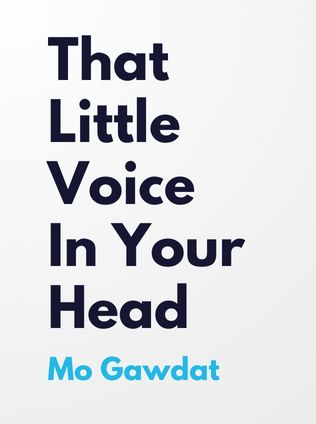
That Little Voice In Your Head
Adjust the Code That Runs Your Brain
By Mo Gawdat
Published 05/2022
About the Author
Mo Gawdat is a multifaceted individual whose life journey combines entrepreneurship, software engineering, and high-level business management. His career reached a pinnacle when he served as the Chief Business Officer at Google [X], the secretive innovation lab of one of the world's most influential technology companies. Despite his vast professional success, Gawdat's life was marked by a personal struggle—a struggle with finding lasting happiness. This internal battle came to a head with the untimely death of his son, Ali. This profound loss became the catalyst for Gawdat's transformative journey toward understanding happiness. In the wake of his son’s death, Gawdat sought to unravel the complexities of happiness, driven by the desire to find peace amidst his grief. His search for answers culminated in a groundbreaking formula, which he detailed in his first book, Solve for Happy. The tragic event not only deepened his understanding of happiness but also ignited his mission to share this knowledge with the world.
Gawdat’s subsequent work, including the mental health podcast Slo Mo, the founding of One Billion Happy, and his latest book, That Little Voice In Your Head, continues this mission. These platforms and writings are dedicated to helping others navigate their own paths to happiness, much like he did in the aftermath of his son’s death. Gawdat’s unique approach combines his analytical mind, honed through years in the tech industry, with deep personal introspection, making his insights both practical and profoundly human.
Main Idea
That Little Voice In Your Head by Mo Gawdat delves into the inner workings of the human brain, likening it to a computer that processes information based on the inputs it receives. Gawdat argues that our thoughts, which he refers to as "that little voice in your head," are the direct result of this processing system. The core premise of the book is that happiness or unhappiness is determined by the "coding" of our brain—how we process and interpret the world around us. Gawdat's goal is to teach readers how to "reprogram" their brains to filter and process information in ways that lead to happiness rather than suffering.
The book is structured into several key sections, each addressing a different aspect of the brain's processing system and offering actionable steps to rectify the common errors that lead to unhappiness. Through a combination of personal anecdotes, scientific research, and practical exercises, Gawdat provides readers with a comprehensive guide to achieving a happier, more fulfilling life.
Table of Contents
- Understanding Your Brain as a Computer
- The Four Processing Errors that Lead to Unhappiness
- How to Reprogram Your Brain for Happiness
- Applying the Lessons: Practical Exercises
- Conclusion: A Life Rewired for Happiness
Understanding Your Brain as a Computer
In That Little Voice In Your Head, Gawdat introduces the concept that our brains function much like computers. This analogy forms the foundation of his argument: just as a computer processes input data to produce an output, our brains process the information we perceive through our senses to produce thoughts, emotions, and ultimately, our experience of life. The output—our thoughts—can either lead to happiness or unhappiness depending on the "code" or mental processes involved.
Gawdat explains that this mental coding is shaped by a variety of factors, including our past experiences, underlying beliefs, and the information we receive from our environment. He emphasizes that much of our unhappiness stems from "bugs" in this mental software—errors in how we interpret and process the information our brains receive. These errors can lead to distorted thinking, negative emotions, and a general sense of dissatisfaction with life.
To illustrate this, Gawdat compares the brain's processing to solving a math problem. If you input the correct numbers and operations, the computer gives you the right answer. But if the input is flawed or the processing method is incorrect, the output will also be flawed. In the same way, if we feed our brains inaccurate or negative information, or if our mental processing is biased or skewed, the resulting thoughts and emotions will be negative, leading to unhappiness.
Gawdat's insight is that by becoming aware of these errors and learning how to correct them, we can "reprogram" our brains to produce thoughts and emotions that lead to happiness rather than suffering.
The Four Types of Information
Gawdat identifies four main categories of information that our brains process:
Sign up for FREE and get access to 1,400+ books summaries.
You May Also Like
The Subtle Art of Not Giving a F*ck
A Counterintuitive Approach to Living a Good Life
By Mark MansonRich Dad Poor Dad
What the Rich Teach Their Kids About Money - That the Poor and Middle Class Do Not!
By Robert T. KiyosakiHow To Win Friends and Influence People
The All-Time Classic Manual Of People Skills
By Dale CarnegieFreakonomics
A Rogue Economist Explores the Hidden Side of Everything
By Steven D. Levitt and Stephen J. Dubner



















